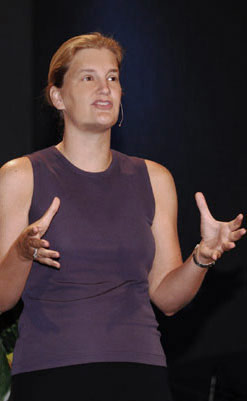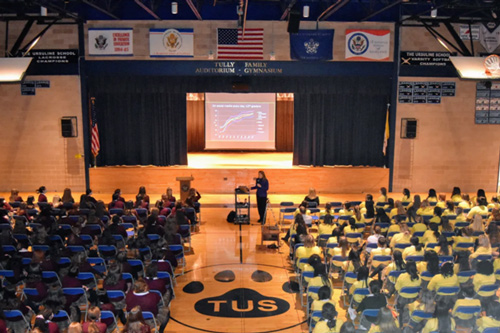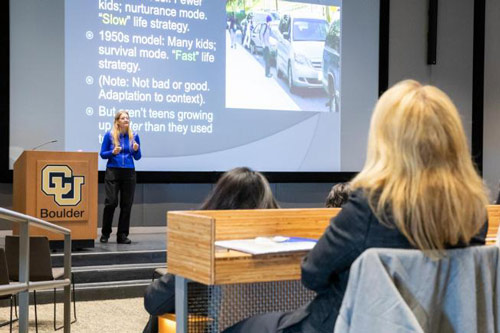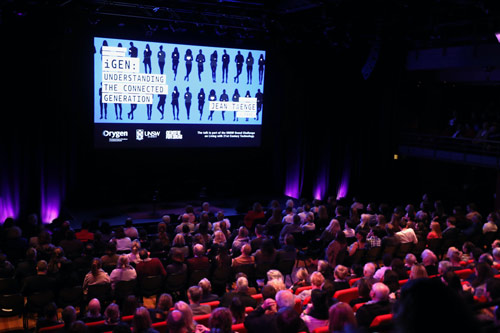Speaking
Dr. Twenge’s talks – spiced with plenty of pop culture and humor – share a look at how technology and other forces have shaped the generations. That includes trends in work attitudes, behaviors, mental health, political views, and many other factors. Conclusions are based on U.S. and international survey and behavioral datasets including 39 million people.
Talks are customized for each audience and can be either virtual or in person. Below is a brief overview of topics often covered for different audiences.

Generations: The Real Differences between Gen Z, Millennials, Gen X, Boomers and Silents—and What They Mean for the Future: What causes generational differences, and how do the generations differ apart from the popular myths? This talk covers the three major trends behind generational differences, the influences and outcomes of the five adult generations, and harnesses extensive survey data to project future trends. Based on Dr. Twenge’s 2023 book, Generations, the talk can be customized to include any of the topics covered in the book. Previous audiences include MidOcean Partners, the Southern California Association of Governments, and Kohlberg & Company.
Generations in the workplace: Recruiting, retaining, and managing Generation Z. How does GenZ really differ from Millennials, GenX, and Boomers? This talk features the most relevant generational trends as well as strategies managers can put in place immediately to more effectively work with GenZ. Previous audiences include Potlatch Deltic, Sequoia Equities, Americas Styrenics, CORD (the Council of Residency Directors for Emergency Medicine), the Veterinary Management Group, the U.S. Army, ADRP Blood Centers, Teach for America, Thompson & Coburn, the U.S. Marine Corps, the Human Resource Leadership Forum, Children’s Hospital of Orange County, the Mayo Clinic Hospital at Phoenix, the Dairy Deli Bakery Council, Sheet Metal and Air Conditioning Contractors’ National Association, Microsoft, Halmar International Construction, and King’s Seafood.
Marketing to Generation Z: Speculations about generational differences have created lots of rumors – but what has really changed? And what does that mean for the future? This talk cuts through the myths to reveal the best trend data on young people, including changes in the speed of development, mental health and happiness, technology use, optimism and pessimism, attitudes around safety, views on advertising, and interest in the environment. Previous audiences include Verizon, WP Global Partners, the Virginia Credit Union, Platte River Equity, Sit Investment Associates and Marquette Associates.
Parenting today’s super-connected teens: Kids these days can seem like a mystery – plus they’re always on their phones. This talk explains how teens are growing up more slowly, how their mental health is suffering, and how heavy technology use is linked to depression and unhappiness. You’ll walk away from this session with ideas for how to help your family find a better balance with technology and be healthier and happier. Previous audiences have included parents from the Ursuline School, Academy of the Holy Names, the Park School, the Webb Schools, Vail Mountain School, the Eureka Union School District, Villa Maria Academy, La Jolla Country Day School, St. Juliana Falconieri School, Ensworth High School, Francis Xavier School, the Hockaday School, Frances Parker School, St. Charles (Illinois) CUSD, Upper Canada College, the Kincaid School, the Academy of the Holy Names, and the Bishop’s School.
Understanding your generation, for teens: Teens and tweens know their lives are different from previous generations’ – but they don’t always understand why, and they often struggle to manage their technology use. This talk helps young people understand the impact of social media and screen time on their mental health and empowers them to take steps to find a better balance with technology. The talk is appropriate for students in grades 6-12 and can be modified for students as young as 3rd grade. Previous audiences have included students at La Jolla Country Day School, the Webb Schools, Vail Mountain School, Palm Beach Day Academy, the Ursuline School, Villa Maria Academy, the Episcopal School of Knoxville, the Kincaid School, the Francis Xavier School, Frances Parker School, St. Margaret’s Episcopal School, St. Juliana Falconieri School, Eagle Hill School, and the Academy of the Holy Names.
iGen: What research tells us about your generation: College students are curious to find out how their generation is different and enjoy learning about how psychology research is conducted. They also want to hear about how they can better manage their technology use. This talk can also be opened up to community members, staff, and faculty. Previous audiences have included Wabash College, SUNY Broome Community College, the University of Tennessee at Martin, Trent University, and Delta College.
Guiding the smartphone generation. Camps, youth organizations, the military, and educators want to understand how Gen Z is different. Even more, they want to guide this generation toward more independence and better mental health. Previous audiences include Fort Moore (Army), the Lilly Foundation, the Institute for Religious Education Delete: Independent Schools Association of the Southwest, Everfi, the Western Association of Independent Camps, Safer California, the Changing the Odds conference, Pearson Education, the JCC of Greater Pittsburgh, the Catholic Campus Ministry Association, the Jewish Federation of Metropolitan Detroit, the Independent Schools Association of the Southwest, the Foundation for Jewish Camp, the Young Marines, Growing Leaders and the National Guard Youth Challenge Program.
 Understanding and improving Gen Z’s mental health. This talk features the latest research on mental health trends for children, teens, and young adults as well as what can be done to counter the rise in depression, anxiety, self-harm, and suicide in this group. This talk can be used to fulfill professional development hours. Previous audiences include the Student Mental Wellness Conference, the California Psychological Association, CICAMH (Critical Issues in Child and Adolescent Mental Health), the Calciano Symposium, the UT-Austin Counseling and Mental Health Center, Hope4Utah, Orygen — the National Centre for Excellence in Mental Health (Australia), Harvard University, Intermountain Health, Primary Children’s Hospital Utah, Mott Children’s Health Center, Vista Hill, the Warren Coalition (Virginia).
Understanding and improving Gen Z’s mental health. This talk features the latest research on mental health trends for children, teens, and young adults as well as what can be done to counter the rise in depression, anxiety, self-harm, and suicide in this group. This talk can be used to fulfill professional development hours. Previous audiences include the Student Mental Wellness Conference, the California Psychological Association, CICAMH (Critical Issues in Child and Adolescent Mental Health), the Calciano Symposium, the UT-Austin Counseling and Mental Health Center, Hope4Utah, Orygen — the National Centre for Excellence in Mental Health (Australia), Harvard University, Intermountain Health, Primary Children’s Hospital Utah, Mott Children’s Health Center, Vista Hill, the Warren Coalition (Virginia).
Teaching and mentoring Gen Z. Are today’s students really different – or am I just getting old? This talk harnesses the data on generational differences to better understand how to teach and mentor this generation, also drawing on Dr. Twenge’s 25 years of experience as a college faculty member. This talk is appropriate for high school and middle school teachers, K-12 administrators, college faculty and staff (including student life), and medical school faculty and physicians who mentor residents. Previous audiences include Duke University, Baylor University, Scottsdale Community College, Santa Maria Catholic High School, Cleveland Lutheran High School Association, Wheaton College, Eagle Hill School, Independent Schools Association of the Southwest, University of Southern California, Miami University Regional Campuses, the University of Massachusetts at Dartmouth, Wabash College, Leeds School of Business at the University of Colorado, the U.S. Military Academy at West Point, the UCSD School of Medicine, Hillel International, the University of Rhode Island, the Family Medicine Department at the University of Calgary, Virginia Commonwealth University School of Business, Sweet Briar College, the New England Commission of Higher Education (NECHE), the University of Minnesota, the University of Georgia, Boston College, UCLA, Illinois Wesleyan University, and Mt. San Jacinto College.
To hire Dr. Twenge for your next event, please contact her directly at jeantwenge@gmail.com.



